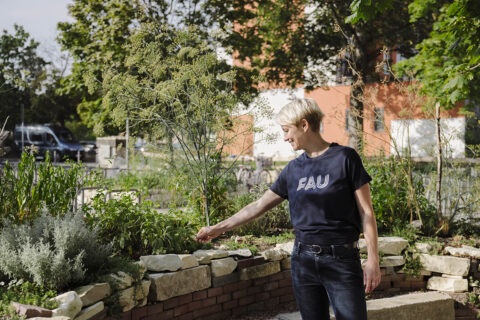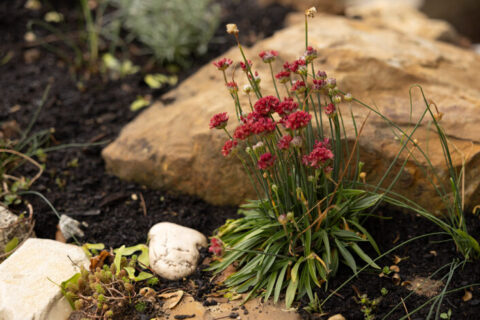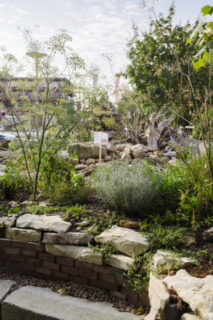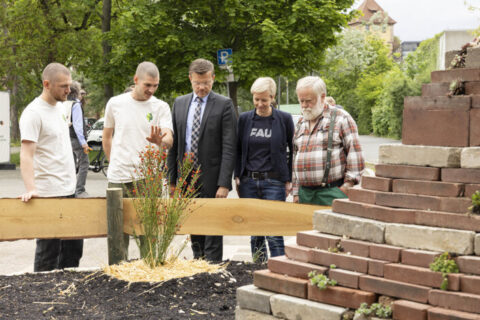From a stone desert to a blooming oasis
What used to be a bleak, deserted space in the Lange Gasse is now the WiSo oasis. However, the path toward the shared garden was anything but easy. It all began with an unusual email and blossomed into a project that made a lasting change to life at our uni.
“It was an ugly piece of land, unused and unsightly,” remembers Iris Dieterich, representative of the board at the School of Business, Economics and Society at FAU. “But once the first rough work was finished, suddenly bees appeared and dug little nests in the earth. I was surprised how quickly the new biotope was accepted.”
The first step on the way to creating a sustainable garden at the entrance to FAU’s School of Business, Economics and Society in Lange Gasse 20 in Nuremberg began with an email. “We have a great idea and funding, and are desperately looking for a location, otherwise the 10,000 euros will go to waste,” was the gist of the message Iris Dieterich, Head of the School Administration, received in her inbox.
“We certainly have land that is not being used,” she thought, replied to the brothers Jonas and Niklas Götz who had sent the email, one of them a landscape gardener, the other a construction machinery mechatronics technician, and started the ball rolling.
What does the construction department have to say? And the finance department? What is the legal framework for a project like this at the University? “It wasn’t easy, the city council did not give their approval in the end. But at FAU individual people all got involved and stood up for the project, it was amazing!” Various inspections took place, sometimes leading to frustration. Here a fence had to be erected for reasons of liability, there the ventilation shafts and access routes had to remain clear – Iris Dieterich, who studied geography herself, remained on the ball.
“At the School, we have encouraged initiatives for sustainability for quite some time now. An urban gardening initiative had already becomes established as part of our strategic process.” Their aim: To support sustainability initiatives and make FAU a more attractive location for working and studying in the future. “However, changes in staff, a lack of funding and a lack of specialist knowledge led to the initiative falling by the wayside.” It was a godsend that the brothers brought all of that with them, supported by the Urban Lab Nuremberg.
Nothing but a stone desert
In November 2023, the first machines arrived to dig up approximately 600 square meters of earth and make room for the garden. But it looked anything but promising at the beginning: There were huge piles of earth, deadwood and brushwood, it looked really uninviting and inhospitable. Nothing but a stone desert.”
It didn’t take long for critical voices to make themselves heard. “Some people questioned whether it was really such a good idea to build something like this in the entrance area.” Nevertheless, the work went ahead as planned, natural stone walls were built, high quality earth was brought in and slowly but surely the transformation started to take place.
Lots of helping hands
The first plants were planted in April 2024, and things started to take shape. “A little wood was planted, a herb garden, berry bushes – suddenly everything started to grow and flourish.” The two initiators were very dedicated: “They dug up the earth, planted plants, coordinated volunteers and even got a school class involved. Approximately 15 people from the city, members of staff and students all got involved. It is unbelievable how much dedication went into the project.” Iris Dietrich was also impressed by how committed certain individuals were to the project, for instance Chair secretary Doris Zinkl. “She just approached the brothers and then got involved in the project straightaway. Now she is out working in the garden every day. The project wouldn’t have been possible without people like her.” It is also handy that the School of Business, Economics and Society has a Chair of Corporate Sustainability Management. Klemens Hering works at the Chair and used his connections to the students to advertise the project.
 Visiting FAU’s WiSo oasis with Irem
Visiting FAU’s WiSo oasis with Irem
To make the city more environmentally friendly and offer animals a new home.
That was the goal which motivated Niklas and Jonas Götz from Pflanzoasen GmbH to design an oasis for plants in the city center, at FAU’s School of Business, Economics and Society. Follow Irem to FAU’s WiSo oasis.
Herbs for the cafeteria
In the meantime, the garden has not only won the Environmental Prize from the city of Nuremberg, it has also become the perfect example of a place that encourages a genuine community spirit. Staff from the neighboring cafeteria gather fresh herbs from the raised beds. “It is just lovely to smell the lavender and sage while sitting there. And the best thing is that the garden is respected. There is no vandalism and considerably less garbage.”
A paradise for the future
The WiSo oasis at FAU is not only a place to relax, it is also a symbol of what is possible if people come together to shape their own world of work. “There are lots of factors standing in the way of implementing projects like this. But at the end of the day, we managed, in spite of all the challenges,” says Iris Dieterich with pride. “The garden thrives from team work and anyone who is interested is welcome to come and join in.”
ContactMore information about the project:
- www.nachhaltigkeit.rw.fau.de/wiso-oase
- www.waswaerewenn2035.de/foerderungen/wiso-oase
- pflanzoasen.de/wiso-oase
Author: Luisa Gerlitz
This article is part of the FAU Magazine
 Innovation, diversity and passion: Those are the three guiding principles of our FAU, as stated in our mission statement. At FAU, we live these guiding principles every day in all that we do – in research, in teaching and when it comes to sharing the knowledge created at our University with society.
Innovation, diversity and passion: Those are the three guiding principles of our FAU, as stated in our mission statement. At FAU, we live these guiding principles every day in all that we do – in research, in teaching and when it comes to sharing the knowledge created at our University with society.
This, the second issue of our FAU magazine, underlines all of the above: It shows researchers who tirelessly keep pushing the boundaries of what has been believed to be possible. It introduces students who work together to achieve outstanding results for their FAU, and talks about teaching staff who pass on their knowledge with infectious enthusiasm and creativity. And it reports on members of staff with foresight and a talent for getting to the crux of the matter who are dedicated to improving the (research) infrastructure at FAU and people in key positions who are there for their University and who campaign tirelessly for our research location.
Download: FAU Magazine (PDF) Read articles online






